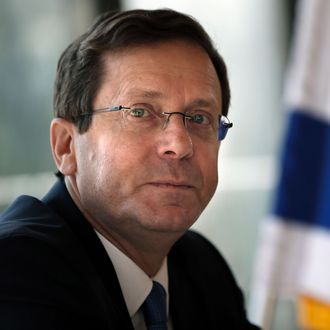
On Monday, Vice-President Biden said that Israel’s current political trajectory “is not one that’s likely to secure its existence as a Jewish, democratic state.”
“The path for peace is shrouded,” Biden said at a gala hosted by J Street, a “pro-Israel, pro-peace” organization that represents an alternative to AIPAC for liberal Zionists. “There is, at the moment, no political will among Israelis and Palestinians to move forward with serious negotiations.”
The vice-president went on to say that America has “an overwhelming obligation, notwithstanding our sometimes overwhelming frustration with the Israeli government, to push them as hard as we can toward what they know in their gut is the only ultimate solution, a two-state solution, while at the same time be an absolute guarantor of their security.”
Several American Jewish leaders and conservative news outlets treated Biden’s remarks as an act of hateful defamation against the Jewish state, with Fox News’s Peter Doocy asking the White House to account for Biden’s “vilification” of Israel.
But it would be difficult for anyone to refute Biden’s essential claim — that Israel currently lacks the political will necessary for reaching a two-state solution with any Palestinian authority.
The country’s sitting prime minister campaigned on a promise that no Palestinian state would be established under his watch. Since winning reelection, Bibi Netanyahu has done nothing to cast doubt on the sincerity of that vow. In recent months, the Likud government has approved hundreds of new housing units for West Bank settlements, over the objections of the United States. A poll taken last fall found a near majority of Israeli Jews saying that the two-state solution is dead.
The day after Biden made his remarks, the leader of Israel’s center-left opposition offered further support for the vice-president’s analysis.
Speaking in the Israeli city of Ashkelon, Zionist Union leader Isaac Herzog called on his party to recognize “the changes Israeli society is going through.” Herzog expressed concern that the center-left was alienating itself from the electorate due to the perception that it has too much affection for the Arab community:
“But how can we find our way into the hearts of members of the public? How can we convince them that we have not only the experience, but also the ability, to improve Israel’s situation, without compromising Israel’s security, heaven forbid, and without giving the impression—and I encounter this at meetings time and time again with the Israeli public—that we are always ‘Arab-lovers’?”
The Zionist Union has given the Israeli public little reason to suspect they give undue deference to Palestinian concerns. Earlier this year, Herzog declared that “now is not the time for a Palestinian state.” Instead, his plan for ameliorating the conflict involves physically and politically separating Palestinian villages in East Jerusalem from the city proper, and completing construction of a security fence around the major West Bank settlement blocs. And yet, by his own account, he is routinely accused of leading a coalition with an unseemly affection for non-Jews.
This political climate is, of course, shaped by the recent wave of small-scale Palestinian terror attacks. (Many would argue that the climate that produces such attacks is itself shaped by the ongoing occupation of the West Bank and the blockade of Gaza.) But regardless of its origins, the political mood in Israel is not conducive to near-term peace. It should not be controversial for the vice-president to acknowledge this reality. The fact that it was reflects unfortunate aspects of our own political climate.






























